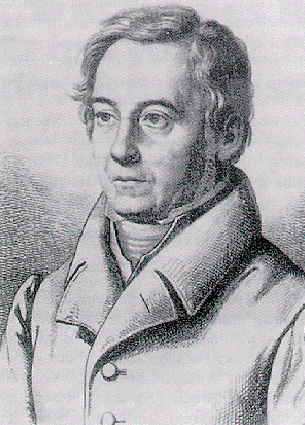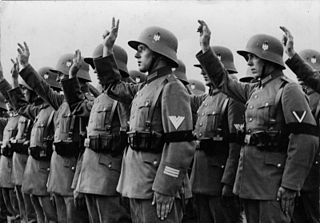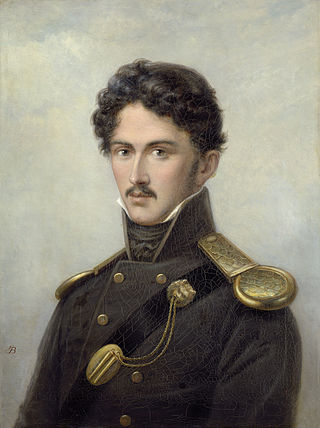
An oath of office is an oath or affirmation a person takes before assuming the duties of an office, usually a position in government or within a religious body, although such oaths are sometimes required of officers of other organizations. Such oaths are often required by the laws of the state, religious body, or other organization before the person may actually exercise the powers of the office or organization. It may be administered at an inauguration, coronation, enthronement, or other ceremony connected with the taking up of office itself, or it may be administered privately. In some cases it may be administered privately and then repeated during a public ceremony.

Ernst Moritz Arndt was a German nationalist historian, writer and poet. Early in his life, he fought for the abolition of serfdom, later against Napoleonic dominance over Germany. Arndt had to flee to Sweden for some time due to his anti-French positions. He is one of the main founders of German nationalism during the Napoleonic wars and the 19th century movement for German unification. After the Carlsbad Decrees, the forces of the restoration counted him as a demagogue.

The Bundeswehr is the armed forces of the Federal Republic of Germany. The Bundeswehr is divided into a military part and a civil part, the military part consisting of the German Army, the German Navy, the German Air Force, the Joint Support Service, the Joint Medical Service, and the Cyber and Information Domain Service.
BRD is an unofficial abbreviation for the Federal Republic of Germany, informally known in English as West Germany until 1990, and just Germany since reunification. It was occasionally used in the Federal Republic itself during the early Cold War; it was commonly used between 1968 and 1990 by the ruling party of the German Democratic Republic, resulting in a strong deprecation of its use in West Germany. The East German regime had previously used the term "German Federal Republic", which it abbreviated as "DBR", to refer to West Germany. The most widely used abbreviation for West Germany in the country itself was its ISO 3166-1 alpha-2 country code "DE", which has remained the country code of reunified Germany.
The German civil servants called Beamte or Beamtinnen have a privileged legal status compared to other German public employees, who are generally subject to the same laws and regulations as employees in the private sector. For example, the state can only fire Beamte if they commit a felony.
An oath of citizenship is an oath taken by immigrants that officially naturalizes immigrants into citizens. It is often the final step in this process, and is usually done in a ceremonial capacity. An oath of citizenship is designed to be a statement of patriotism and loyalty to the new country. In countries which retain a monarchical system of government, an oath of allegiance to the monarch is often required as well. Adding an oath to God to the end of an oath is usually optional.

The Hitler Oath —also referred in English as the Soldier's Oath—refers to the oaths of allegiance sworn by officers and soldiers of the German Armed Forces and civil servants of Nazi Germany between the years 1934 and 1945. The oath pledged personal loyalty to Adolf Hitler in place of loyalty to the constitution of the country. Historians view the personal oath of the Third Reich as an important psychological element to obey orders for committing war crimes, atrocities, and genocide. During the Nuremberg trials, many German officers unsuccessfully attempted to use the oath as a defence against charges of war crimes and crimes against humanity.

"Ich hab mich ergeben", originally titled "Gelübde" ("Vow"), is a German patriotic song. The text was written in 1820 by Hans Ferdinand Maßmann. It was one of the unofficial national anthems of West Germany from 1949 to 1952, when the "Deutschlandlied" was officially reinstated. Its tune is now used in the Micronesian national anthem.
The Geschwister-Scholl-Preis is a literary prize which is awarded annually by the Bavarian chapter of the Börsenverein des Deutschen Buchhandels and the city of Munich. Every year, a book is honoured, which "shows intellectual independence and supports civil freedom, moral, intellectual and aesthetic courage and that gives an important impulse to the present awareness of responsibility".
Eckhard Jesse is a German political scientist. Born in Wurzen, Saxony, he held the chair for "political systems and political institutions" at the Technical University of Chemnitz from 1993 to 2014. Jesse is one of the best known German political scholars in the field of extremism and terrorism studies. He has also specialized in the study of German political parties and the German political system.

Alfred Grosser is a German-French writer, sociologist, and political scientist. He is known for his contributions towards the Franco-German cooperation after World War II and for criticizing Israel.

The Pfadfinderbund Weltenbummler e.V.(Scouts' Association Globetrotter) is an inter-confessional and apolitical German Scout association founded in 1981. It has about 2000 members and is part of the World Federation of Independent Scouts (WFIS), the Duke of Edinburgh's Award (DofE), the German Scout Association (DPV), the Bavarian Scout Council and the German Parity Welfare Association. It is recognized by German law as a charitable and nonprofit organization. The association is built on the principles constituted by Robert Baden-Powell. The scout uniform is dark blue; they wear black pants and striped neckerchiefs with varied woogles.

Jürgen Roth was a German publicist and investigative journalist.

Leyer und Schwert is a patriotic opera in five acts composed by Wendelin Weißheimer to a libretto by Louise Otto-Peters. Also known as Theodor Körner, the opera was composed in 1863/64 and premiered in Munich in 1872. The libretto is based on an episode in the life of the German poet and soldier Theodor Körner.
Ilko-Sascha Kowalczuk is a German historian and author. His work is focused on the German Democratic Republic and its Ministry for State Security.

Götz Kubitschek is a German publisher, journalist and far-right political activist. He espouses ethnocentric positions and is one of the most important protagonists of the Neue Rechte in Germany. Hailing from the staff of right-wing newspaper Junge Freiheit, Kubitschek is one of the founders of the Neue Rechte think tank Institut für Staatspolitik. Since 2002, he is the manager of his self-founded publishing house Antaios, since 2003 chief editor of the journal Sezession, as well as editor of the corresponding blog Sezession im Netz.
Hugo Paul was a German politician (KPD). In 1932 he was briefly a member of the country's national parliament ("Reichstag").

Johann Georg August Wirth was a German lawyer, writer and politician during the Vormärz period that preceded the German revolutions of 1848–1849.

Various organisations in Nazi Germany required their members to swear oaths to Adolf Hitler by name, rather than to the German state or an officeholder. Such oaths were intended to increase personal loyalty to Hitler and prevent dissent. The Hitler oath, introduced for all members of the Wehrmacht and civil servants in 1934, was one such oath. Others were sworn by members of organisations such as the Schutzstaffel (SS), whose oath may have inspired the Hitler oath, and by the Hitler Youth.

Inner German relations, also known as the FRG-GDR relations, East Germany-West Germanyrelations or German-German relations, were the political, diplomatic, economic, cultural and personal contacts between the Federal Republic of Germany and the German Democratic Republic, at the period of the West-East division in German history from the founding of East Germany on 7 October 1949 to Germany's reunification on 3 October 1990.













